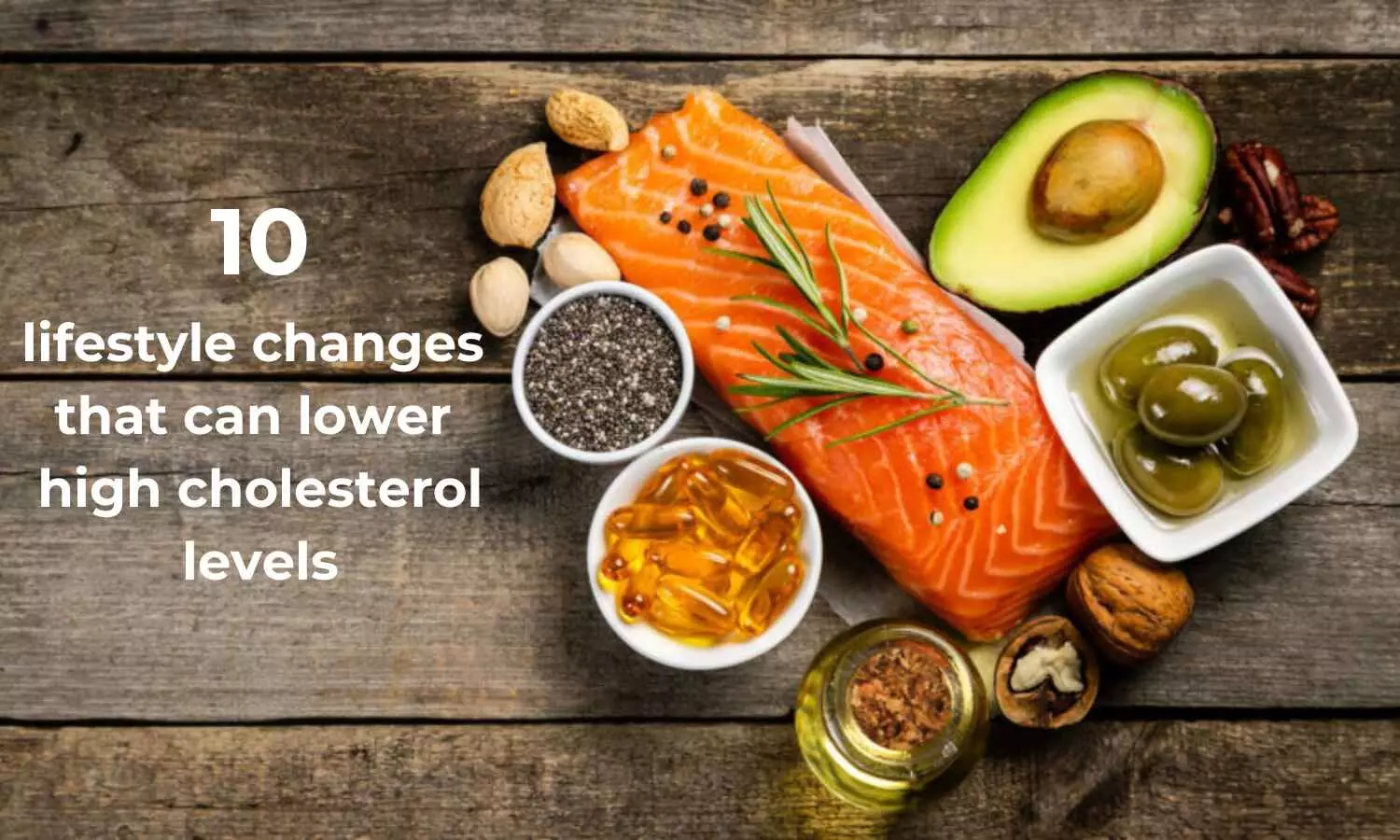10 lifestyle changes that can lower high cholesterol levels
Learn how simple lifestyle changes can naturally lower cholesterol levels and enhance overall heart health effectively.
image for illustrative purpose

High cholesterol raises the risk of heart attacks and other diseases. While medications can help, making lifestyle changes can greatly improve your cholesterol. Try these 10 healthy changes.
1. Ensure intake of monounsaturated fats
Instead of a low-fat diet, which has mixed results for managing cholesterol, focus on consuming monounsaturated fats. Research shows that a diet rich in monounsaturated fats, like the Mediterranean diet, can lower harmful LDL cholesterol and raise beneficial HDL cholesterol. Great sources of monounsaturated fats include -
i) Canola oil
ii) Olives
iii) Olive oil
iv) Nut butters
v) Nuts (such as cashews, almonds, and pecans)
vi) Avocados
Incorporating these foods into your diet can help improve your cholesterol levels and support heart health.
2. Eat soluble fiber
Soluble fiber, found in plants and whole grains, is beneficial for heart health. It helps lower LDL cholesterol and can protect against cardiovascular diseases. Good sources include oat cereals, beans, lentils, brussel sprouts, fruits, peas, and flaxseeds. Adding these foods to your diet can contribute to better cholesterol levels and overall heart health.
3. Limit trans fats
Trans fats are unsaturated fats that have been altered through a process called hydrogenation, which makes them more stable. However, these fats are handled differently by the body compared to other fats, and not in a good way. They raise LDL (bad) cholesterol and total cholesterol levels while lowering beneficial HDL (good) cholesterol. Common sources of trans fats include margarine, shortening, pastries, baked goods, microwave popcorn, fried fast foods, pizzas, and non dairy coffee creamer. Limiting these foods helps reduce your intake of trans fats and supports better heart health.
4. Focus on polyunsaturated fats and omega-3s
Polyunsaturated fats are beneficial for heart health as they lower LDL cholesterol and reduce the risk of heart diseases. They also play a crucial role in decreasing the likelihood of metabolic syndrome and type 2 diabetes. Omega-3 fatty acids, a type of polyunsaturated fat particularly good for the heart, can be found in fatty seafood and fish oil supplements. Examples include salmon, mackerel, herring, deep-sea tuna like bluefin or albacore, and to a lesser extent, shellfish such as shrimp. Including these foods in your diet can contribute to better heart health and overall well-being.
5. Exercise
Exercise is highly beneficial for heart health in multiple ways. It enhances physical fitness, aids in preventing obesity, and lowers harmful LDL cholesterol while boosting beneficial HDL. According to the American Heart Association, engaging in 150 minutes of moderate aerobic exercise weekly effectively reduces cholesterol levels.
6. Maintain a healthy weight
Being overweight or obese raises your risk of high cholesterol. Losing weight can help lower your cholesterol levels because it reduces harmful LDL and increases beneficial HDL. It's important to consult a doctor to find a healthy diet and a plan to manage your weight effectively and sustainably. This approach can have a dual benefit on your cholesterol levels and overall health.
7. Quit Smoking
Smoking increases heart disease risk by raising LDL, lowering HDL, and promoting artery blockage. Quitting smoking can reverse these harmful effects, and your doctor can help you create a personalized plan to quit.
8. Moderate Alcohol Intake
Alcohol's impact on heart health is a subject of debate. Some studies suggest moderate drinking can raise HDL and lower heart disease risk. However, the CDC and AHA caution against drinking solely to improve heart health, citing insufficient evidence. If you drink, follow CDC guidelines: up to two drinks per day for men and one for women.
9. Consider Plant Sterols and Stanol
Plant sterols and stanols, found naturally in certain oils and added to others, help lower cholesterol and LDL levels. Research suggests daily intake of 1.5–3 grams can lower LDL by 7.5–12%. Incorporate them into your diet or through supplements under medical guidance.
10.Explore Supplements
Certain supplements may benefit cholesterol and heart health -
i) Fish oil provides omega-3s but can sometimes raise LDL.
ii) Psyllium, a soluble fiber supplement, may lower cholesterol.
iii) Coenzyme Q10 aids energy production and ongoing research explores its potential cholesterol-lowering effects. It is ideal to consult a healthcare provider before starting any supplement routine.
In some cases, making healthy lifestyle adjustments may not sufficiently lower cholesterol levels. If your doctor advises medication to manage cholesterol, follow their prescription diligently while following a healthy routine. Combining medication with appropriate lifestyle changes can help improve your cholesterol profile and overall cardiovascular health.

